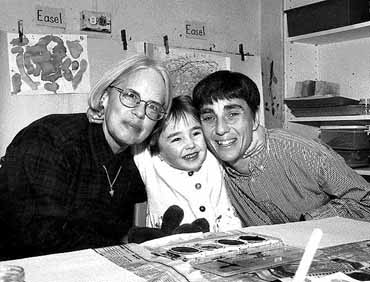Princeton Weekly Bulletin, February 16, 1998
"We focus on the individual"
By Pam Hersh

![]() You
can't go to school to learn the business of financial aid," says
Robin Moscato, associate director in the Office of Undergraduate
Financial Aid. "You just have to do it -- and do it with both
your head and your heart."
You
can't go to school to learn the business of financial aid," says
Robin Moscato, associate director in the Office of Undergraduate
Financial Aid. "You just have to do it -- and do it with both
your head and your heart."
Moscato learned how to do her job at school, but not in school. While a student at Rutgers University, she worked in the Rutgers Financial Aid Office as a way of financing her own education. After graduating in 1979, she worked in the financial aid operations of both Rutgers and Middlesex County College. Four years later she joined the Princeton financial aid team; she was promoted to associate director nine years ago.
"The notion that financial aid officers are just number crunchers and paper pushers is a total misconception," Moscato says. "It's wonderfully humane at Princeton University -- we focus on the individual."
No enrollment management
The University not only has need-blind admission, but the financial aid awards are need-based. Princeton engages in no "enrollment management" or manipulating financial aid awards to win certain students. As Moscato puts it, "We never have to rob Peter to pay Paul."
Moscato says she spends half of her work time "actually interacting with families, in order to come up with the best way to finance their children's Princeton education. I've developed some great friendships with students and their parents. Even if people are not completely happy with the end result as far as the amount of money they're expected to contribute, they're all happy with the process at Princeton. It's flexible, nonbureaucratic and features a lot of personal contact. There are no long lines of students waiting to see a financial aid counselor for a two-second appointment."
In recent weeks, Moscato has been involved in preparing for the effect of changes in the University's financial aid policies approved by the trustees on January 24. The new policies reduce the amount lower and middle income families are expected to contribute to their children's Princeton education. She has worked especially hard on an Early Estimator program for the Financial Aid Office home page.
"The Early Estimator program includes a simple worksheet that families can fill out to get an idea of what a Princeton education would cost them," Moscato explains. "The worksheet only includes 22 questions, and it's completely anonymous, but the program is specific to Princeton's own methodology and gives a result that's as similar as possible to what you would get if you went through the whole financial aid procedure."
The Early Estimator program in is expected to be available on the home page "later this month," she says.
Complex adoption process
A passionate aficionado of long-distance running, biking and cross-country skiing, Moscato enjoys the peace and solitude of these activities as a way of dealing with the pressures of her work.
Athletic activities have also served as an effective way of working through some of the complex issues in her personal life. With the focus and perseverance of a marathoner, Moscato jumped through the legal hoops necessary to attain her goal of raising a child in a same-sex relationship. Though she is the natural mother of K.L. (Karen Leslie), she had to give up her rights as a natural parent and become an adoptive parent, so that her partner, Michelle Goffe, could also adopt K.L. under New Jersey's second-parent adoption laws.
In November 1997 a N.J. judge granted gay couples the same status as heterosexual couples in adopting children.
"This was wonderful," Moscato says, "but it didn't really address the problem Michelle and I were having. Since I'm K.L.'s natural mother, Michelle and I were not trying to adopt as a couple. Michelle was only trying to adopt as my spouse. But since we can't marry, the law will not recognize Michelle as my legal spouse the way it does married stepparents. So we both had to adopt K.L. individually."
Working out the adoption and crafting a contractual arrangement that is the legal equivalent of a civil marriage has taken a lot of time but was "worth every minute of it," Moscato says. K.L., a wannabe ballerina and a student at U-Now Nursery School, "has made us both so happy and has delighted my parents, who live locally and are very involved grandparents."
Task force chair
While bringing about changes in her off-campus life, Moscato has also been involved with major changes taking place on campus regarding the University's approach toward the gay and lesbian community.
"In 1982 you had to look long and hard to find the gay community," she recalls. "Now the gay community maintains a visible and politically prominent presence on campus." The University has included sexual orientation as part of its affirmative action statement, extended benefits to domestic partners, and established a Gay, Lesbian and Bisexual Task Force, of which Moscato is cochair.
In recognition of her work on behalf of the gay and lesbian community, she was recently honored with a Service Recognition Award on the occasion of the 25th Anniversary of the Lesbian, Gay and Bisexual Alliance.